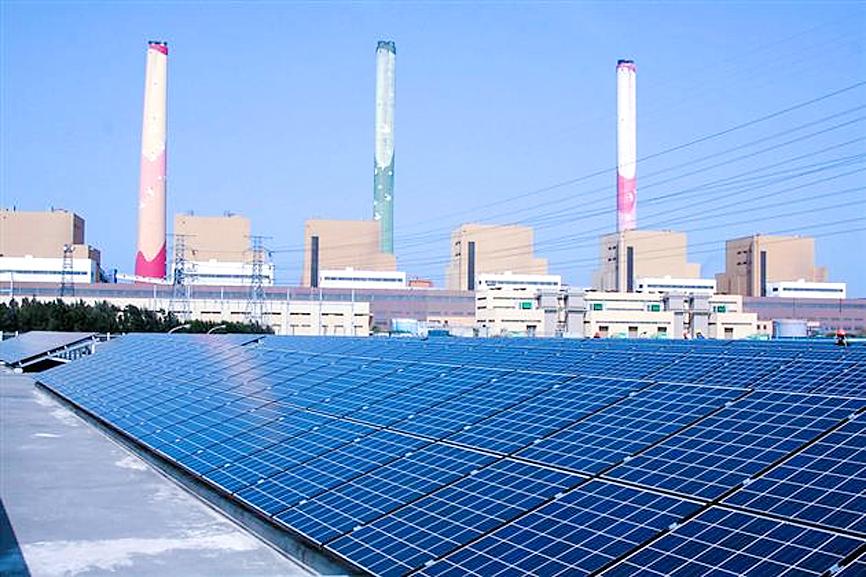Taiwan Power Co (Taipower, 台電) yesterday continued to urge the Taichung City Government to approve new liquefied natural gas (LNG) generators to further the utility’s emissions-cutting plan of phasing out its coal-fired generators.
Taipower’s remarks came as the city government demanded that Taipower decommission four coal-fired plants before constructing the LNG generators, a timetable that the utility has rejected.
Taipower’s plan to build an LNG terminal and two generators in Taichung has been rejected seven times by the city government, the Chinese-language Liberty Times (sister paper of the Taipei Times), reported yesterday, citing an unnamed Taipower executive.

Photo courtesy of Taiwan Power Co
Taipower manager Chang Ting-shu (張廷抒) confirmed that Taipower “remains in talks” with the city government to obtain approval to begin construction of the generators.
“It is unreasonable for Taichung to ask for the old generators to be decommissioned before the new generators are built,” Chang said.
Construction would take “at least three years” for the generators, and “longer” for the terminal, which would ensure a steady supply of LNG to the generators.
“Compared with coal, LNG produces less pollution,” Chang said. “The sooner we switch to gas, the better the air quality will be.”
Unlike coal-fired power plants, LNG generators can be adjusted up or down relatively easily, which is to become increasingly important as Taiwan becomes more reliant on renewable energy sources, such as solar or wind, Chang said.
“A cloud in the sky or wind blowing in the wrong direction will affect how much electricity we get from renewables,” Chang said. “With LNG generators, we can more easily compensate for that volatility.”
Asked if Taipower intends to decommission the coal plants once the LNG generators are built, Chang said that they planned to keep the plants “on standby.”
“It is an insurance policy to ensure the stability of the system,” Chang said.

The US dollar was trading at NT$29.7 at 10am today on the Taipei Foreign Exchange, as the New Taiwan dollar gained NT$1.364 from the previous close last week. The NT dollar continued to rise today, after surging 3.07 percent on Friday. After opening at NT$30.91, the NT dollar gained more than NT$1 in just 15 minutes, briefly passing the NT$30 mark. Before the US Department of the Treasury's semi-annual currency report came out, expectations that the NT dollar would keep rising were already building. The NT dollar on Friday closed at NT$31.064, up by NT$0.953 — a 3.07 percent single-day gain. Today,

‘SHORT TERM’: The local currency would likely remain strong in the near term, driven by anticipated US trade pressure, capital inflows and expectations of a US Fed rate cut The US dollar is expected to fall below NT$30 in the near term, as traders anticipate increased pressure from Washington for Taiwan to allow the New Taiwan dollar to appreciate, Cathay United Bank (國泰世華銀行) chief economist Lin Chi-chao (林啟超) said. Following a sharp drop in the greenback against the NT dollar on Friday, Lin told the Central News Agency that the local currency is likely to remain strong in the short term, driven in part by market psychology surrounding anticipated US policy pressure. On Friday, the US dollar fell NT$0.953, or 3.07 percent, closing at NT$31.064 — its lowest level since Jan.

The New Taiwan dollar and Taiwanese stocks surged on signs that trade tensions between the world’s top two economies might start easing and as US tech earnings boosted the outlook of the nation’s semiconductor exports. The NT dollar strengthened as much as 3.8 percent versus the US dollar to 30.815, the biggest intraday gain since January 2011, closing at NT$31.064. The benchmark TAIEX jumped 2.73 percent to outperform the region’s equity gauges. Outlook for global trade improved after China said it is assessing possible trade talks with the US, providing a boost for the nation’s currency and shares. As the NT dollar

The Financial Supervisory Commission (FSC) yesterday met with some of the nation’s largest insurance companies as a skyrocketing New Taiwan dollar piles pressure on their hundreds of billions of dollars in US bond investments. The commission has asked some life insurance firms, among the biggest Asian holders of US debt, to discuss how the rapidly strengthening NT dollar has impacted their operations, people familiar with the matter said. The meeting took place as the NT dollar jumped as much as 5 percent yesterday, its biggest intraday gain in more than three decades. The local currency surged as exporters rushed to